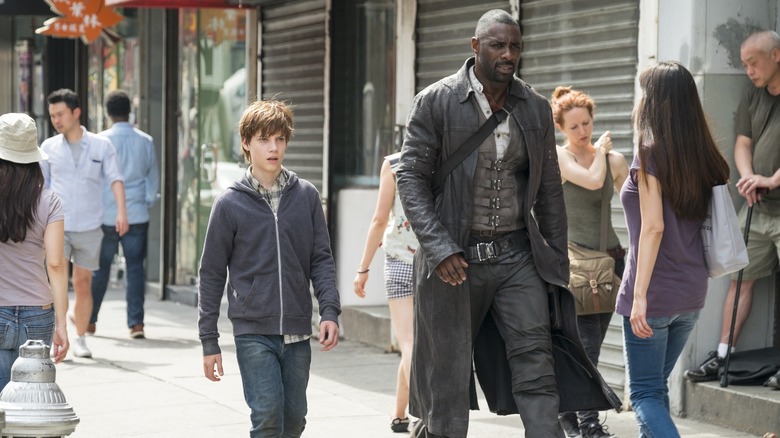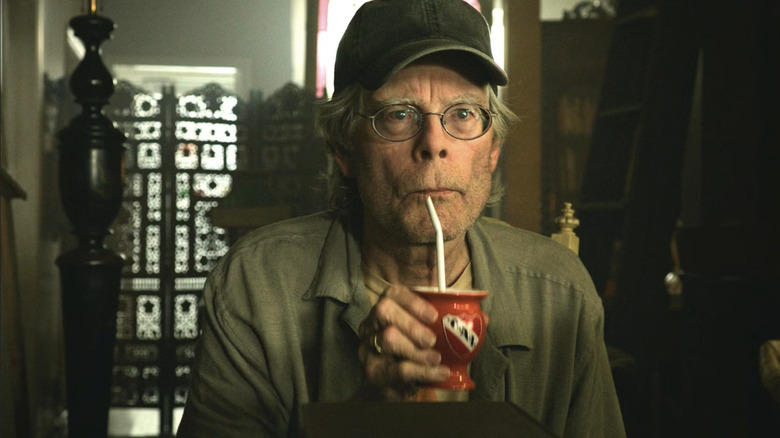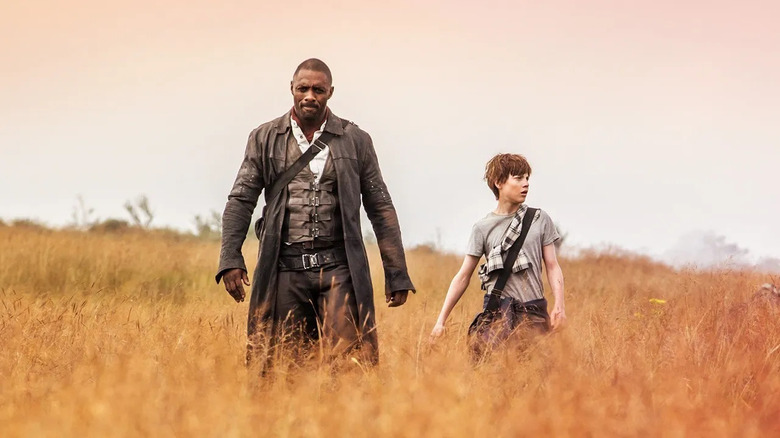Stephen King's Best Dark Tower Book Had An Agonizing Cliffhanger Fans Hated
Part of why Stephen King fans are so excited about the upcoming TV adaptation of "The Dark Tower" is that the book series it's based on is uniquely personal for the horror master. In his introductions and afterwards for the novels, he'd describe the series as something that was channeled through him in mysterious ways; it was often effortless in a way he didn't feel with his other novels.
King's spiritual approach to the "Dark Tower" series led to some questionable story choices, like his decision to base the fourth book around a 500-page flashback to Roland's childhood. From a Writing 101 perspective, this was a bad idea. But the way King talked about it, it didn't seem like he had a choice. Ka (the Gilead High Speech word for "fate") decreed the massive flashback had to be there, and who was King to argue with Ka?
Apparently, Ka also decreed that the third book in the series, "The Waste Lands," needed to conclude on the most egregious cliffhanger of King's career. It ends with the main characters trapped in a giant sentient train, one that plans to derail itself unless the characters beat it in a game of riddles. How do the characters manage to out-riddle the highly-intelligent train? "The Waste Lands" doesn't tell you. Readers had to wait until the start of the next book, "Wizard and Glass," to find out if (and how) the main character survive.
Back in the '90s, readers were pissed. This was the first time King had left the readers on such an incomplete note, and he added insult to injury by taking six years to release the next novel. For the first time, his approach of "I'll get around to the sequel when Ka says it's time" no longer seemed charming to his constant readers.
Stephen King recalled the many angry letters he received from Dark Tower fans
Two years before King officially resolved the cliffhanger, he started writing "The Green Mile," a novel that was originally published in installments. King noted in his forward that, thanks to the feedback he'd gotten from "The Waste Lands," he would be publishing these installments in a quick and timely fashion. As he explained:
"We get dozens of angry letters each week, demanding the next book in the 'Dark Tower' cycle (patience, followers of Roland; another year or so and your wait will end, I promise). One of these contained a Polaroid of a teddy-bear in chains, with a message cut out of newspaper headlines and magazine covers: RELEASE THE NEXT DARK TOWER BOOK AT ONCE OR THE BEAR DIES, it said. I put it up in my office to remind myself both of my responsibility and of how wonderful it is to have people actually care a little about the creatures of one's imagination."
At the time, King stood by the cliffhanger, talking about it in his author's note in "The Waste Lands" as if it was out of his control. "Although you are not obligated to believe me, I must nevertheless insist that I was as surprised by the conclusion to this third volume as some readers may be," he wrote. "Yet books which write themselves (as this one did, for the most part) must also be allowed to end themselves."
In his later author notes he expressed some regret over this attitude, especially after the fifth book, "Wolves of the Calla." In real life, King was hit by a van in 1999, and the near-death experience encouraged him to commit to writing the fifth, sixth, and seventh "Dark Tower" books as quickly as possible, regardless of whether he was in the mood or not.
Will the Dark Tower TV show avoid the books' cliffhanger?
The other element of King's guilt was that he too was surprised by how long it took to finish the fourth book. The delay was not as bad as what "Game of Thrones" fans have had to endure with the supposedly upcoming "The Winds of Winter," but it was a far bigger publication gap than King saw coming, one that King never again repeated in the series.
The clearest expression of King's guilt over the "Waste Lands" cliffhanger came in the books themselves; the final two novels feature a meta storyline where the characters talk to King himself and urge him to hurry up and finish the books already. They find out that the story of the Dark Tower is being transmitted through King's writing by a higher force, and they use a bit of hypnotism to force King to get back to writing it again. If that's not an implicit apology to readers, I don't know what is.
The good news is that while King might have second thoughts about the cliffhanger, the upcoming TV show will have the opportunity to avoid the cliffhanger entirely. With the benefit of hindsight, showrunner Mike Flanagan might choose to resolve the Blaine the Train storyline in a single action-packed season finale. Forget taking six years to resolve that storyline; why not resolve the storyline with no wait at all?


